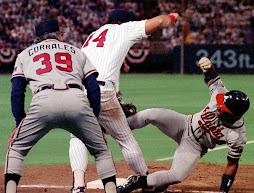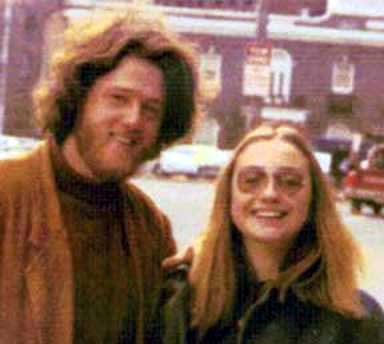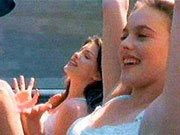Kalas got to live his dream
By Frank Fitzpatrick
INQUIRER STAF WRITER
This story was first published on Jul 28, 2002
NAPERVILLE, Ill. - Carol Drendel recalled the long-ago date when a young Harry Kalas, his blond crew-cut Brylcreemed to a perfect ridge in front, took her to a drive-in movie in his father's Packard.
"He just sat there the whole night," she said, "and pretended he was announcing a baseball game. "
Her husband, Gib Drendel, remembered the hard-of-hearing world history teacher at Naperville Community High School in Kalas' junior year.
"In that class, to entertain everyone, Harry used to cup his hands around his mouth and pretend to be announcing a Washington Senators game," Drendel said. "He'd go, 'Here's the 3-2 pitch from Cam-il-o Pas-cual. ' "
A half-century ago, Naperville was a small town. Many of its 7,000 residents worked at Kroehler Manufacturing Co.'s massive furniture factory and lived on quiet, tree-shaded streets, some of which ran near the wide banks of the DuPage River. It was, looking back anyway, a kind of malt-shop Valhalla.
"During the 1950s," reads a town history written in 1981, "Centennial Beach, the YMCA, summer band concerts with ice cream socials were Naperville's prime public recreational offerings. "
Few would have believed that by 2002 its population would be swollen to 133,000. Fewer still could have envisioned the disappearance of the surrounding dairy farms and forests as Naperville transformed itself from Main Street to Main Line, becoming a yuppie haven for Chicago commuters.
But no one who knew him back then would be the least bit surprised that Harry Kalas became a legendary baseball broadcaster.
"Harry got to live out his dream," said Gib Drendel, a family-law attorney in nearby Batavia. "How many people can say that? "
His deep-voiced destiny was so clear to the rest of the 109 seniors in 1954 that someone at the high school's yearbook, the Arrowhead, placed these prophetic words alongside the photo of the blond kid with the impish smirk:
"Harry Kalas . . . Future Sports Announcer. "
"Harry loved baseball, and he had this big loud voice," said classmate Gene Drendel, Gib's cousin, a retired school administrator who still lives here. "We all knew he was going to be announcing sports somewhere someday. We just assumed it would probably be in Chicago. "
In the days leading up to Kalas' induction today into the broadcasters' wing of the Baseball Hall of Fame, longtime residents here recalled fondly the tow-headed teenager whom, because of his diminutive stature through most of high school, they called "Pots. "
The friendliness, tearful sentimentality and broadcasting gifts that are Kalas' hallmarks were born here in this Ozzie and Harriet community, nearly 30 miles west of Chicago. Harry Kalas at 66, in fact, is not much different from "Pots" Kalas at 16, say his Naperville acquaintances, right down to his fondness for a postgame cocktail and a cigarette.
"He has stayed the same through the years," said Jeanine Warnell, a retired Naperville Community teacher who introduced Kalas to public speaking in her sophomore English class. "He was just one of those students I've never forgotten. I'm so proud of him. "
Kalas was described as a bright and good-natured boy who swam with friends in the local limestone quarries, consumed square scoops of ice cream and drank "Green Rivers" (lime juice and soda water) at a riverside drive-in called Prince's Castle, watched Western movies at the Naper Theater downtown, and starred - in drag - in his senior class play.
He also was the son of a preacher, though as those same friends point out, that hardly qualified him as an angel. One look at Kalas' yearbook photos reveal that this 1950s teenager must have admired James Dean as well as Dizzy Dean.
His blue jeans were rolled up roguishly at the bottom. He wore a defiant crew cut and had a mischievous grin. Like many of his classmates, he smoked at the soda shops and ice-cream parlors, snuck a couple of beers on weekends, and loved to play poker in the basement of Gene Drendel's Washington Street house during school lunch breaks.
"Harry was . . . well, Harry was a real fun-loving guy," said Gib Drendel. "Still is, from what I understand. I'll always remember the night we sat in a car outside his house and made bets on whether or not he would be able to walk into his house without falling down. He fell flat on his face short of the door.
"But he wasn't a bad kid. He was a wonderfully friendly person and had absolutely no pretense about him. "
At school, where his more-serious older brother, Jim, had been president of the Class of 1951, Kalas was a student council officer as a freshman - helping to plan the "Shamrock Shuffle" St. Patrick's Day Dance - a member of the journalism club, a backup linebacker on the football team, and, with his prematurely booming voice, a fixture in the class plays.
"I can still see him in that long black dress as the lead in Charlie's Aunt his senior year," said Warnell, who directed those plays. "He was just marvelous in the part. And so funny. "
In class, he was a somewhat indifferent student whose passion, from a very early age, was clear: sports.
"Harry loved sports. He knew all the different sports and all the different announcers," Gene Drendel said.
And from the day his father took him to old Comiskey Park to see a White Sox-Senators game, and Washington star Mickey Vernon escorted him into the dugout, baseball headed the list.
Alone in the handsome brick corner home the Kalases occupied at 153 N. Julian St., young Harry would occupy himself for hours playing Ethan Allen's All-Star Baseball, a board game in which the outcome of a player's at-bat is determined by the spin of a dial.
Not surprisingly, Kalas soon began to announce those games. Friends say that, even then, he sounded professional. He had inherited his father's deep, pulpit voice.
Harry H. Kalas was a Methodist minister. He moved his wife and two young sons here from Chicago's North Side during World War II to teach in the seminary affiliated with North Central College, a church-run school just a few blocks from Kalas' boyhood home.
"All the cliches you hear about the minister's son, they were all true in Harry's case," Gib Drendel said. "Harry liked to have a good time. "
Kalas was a backup linebacker on coach C. Weston Spencer's team, which won 12 games over his junior and senior seasons.
"He was a heck of a basketball player, too," said Gib Drendel. "He grew real late, so he was always too small for the varsity. But I remember that he led the intramural league in scoring. "
After graduating from Naperville Community in 1954, Kalas went to Cornell College in Mount Vernon, Iowa, another Methodist-run institution.
There, early in the first semester, a blind speech professor heard Kalas' voice in class and was struck by its resonance.
"He said to Harry, 'Son, you've got to become an announcer,' " recalled Gib Drendel, who along with two other Naperville graduates attended Cornell with Kalas.
But Kalas chafed under that church-related colllege's strict discipline, and - apparently with some encouragement from Cornell officials - transferred to the University of Iowa.
There, he began to broadcast the games of several Hawkeyes teams and was smitten. Drafted into the Army after graduation, he was lucky enough to be stationed at Schofield Barracks in Hawaii.
Hearing that Bill Whaley, a onetime Pacific Coast League pitcher, owned the South Pacific cocktail lounge downtown, Kalas went there one night for some beer and baseball conversation. It was a life-changing night.
Whaley told Kalas that big-league broadcaster Buddy Blattner was due at the bar in a few hours. Blattner told the young private that the Sacramento Solons of the PCL would be moving to Honolulu that year.
Kalas applied for the broadcaster's job and got it, submitting a tape from a Minnesota-Iowa game. And since the season started in April and he wasn't due to be discharged until July, he convinced the Army to grant him an early dismissal.
He announced Hawaii's games for several years on KGO-AM, recreating road games from wire-service accounts. And then, in 1965, he landed a job with the Houston Astros. Six years later, he and Veterans Stadium debuted in Philadelphia. The former has held up considerably better than the latter.
"It's been quite a career when you look at it," Gene Drendel said. "All those years of minor-league and major-league baseball. All those years in Philadelphia. All those commercials and NFL Films things he does. It's amazing.
"And to think he started out right here in Naperville. "
from espn:
WASHINGTON -- Longtime Philadelphia Phillies broadcaster Harry Kalas, who punctuated innumerable home runs with his "Outta here!" call, died Monday after being found passed out in the broadcast booth before a game against the Washington Nationals. He was 73.
"We lost our voice today," team president David Montgomery said, his voice cracking. "He has loved our game and made just a tremendous contribution to our sport and certainly to our organization."
Some of the more memorable notes in Kalas' illustrious broadcasting career:
• Six no-hitters
• Mike Schmidt's 500th home run on April 18, 1987
• Every one of Steve Carlton's starts from 1972-86
• Pete Rose's 3,631st career hit on Aug. 10, 1981 (which broke Stan Musial's NL record)
• First game at the Houston Astrodome, April 12, 1965
• First game at Veterans Stadium, April 10, 1971
• First game at Citizens Bank Park, April 12, 2004
• Was in his 43rd year as a MLB broadcaster
• Phillies broadcaster since 1971; member of original Astros broadcast team in 1965
• Inducted into the broadcaster's wing of the National Baseball Hall of Fame in 2002
• Named Pennsylvania Sportscaster of the year 18 times
Kalas was discovered by the Phillies director of broadcasting about 12:30 p.m. and taken to a local hospital, Montgomery said.
Kalas had surgery earlier this year for an undisclosed ailment that the team characterized as minor. He looked somewhat drawn last week as the Phillies opened the season at home.
Kalas joined the Phillies in 1971. Before that, he was a member of the Houston Astros' broadcast team from 1965-70.
In 2002, he received the Baseball Hall of Fame's Ford C. Frick Award for his contributions to the game.
"Players come and go, but 'Outta here!' -- that's forever," said Scott Franzke, a Phillies radio broadcaster.
Kalas lent his sonorous voice to everything from puppies to soup. He did work for NFL Films, was the voice for Chunky Soup commercials and Animal Planet's annual tongue-in-cheek Super Bowl competitor, the Puppy Bowl.
Cincinnati Reds broadcaster Marty Brennaman, a contemporary of Kalas' and a fellow Ford Frick Award winner, said Kalas' legacy will extend beyond the broadcast booth.
"I always find it interesting when a celebrity passes away and people are so quick to say, 'He was a great actor,' or, 'He was a great broadcaster.' Harry Kalas was a great person,'' Brennaman told ESPN.com's Jerry Crasnick. "As much as we will remember Harry as a broadcaster, many of us will remember him even more as being a hell of a guy.''
Brennaman said he spoke to Kalas by phone late last week. The friends talked for 45 minutes, and among other things, they discussed the importance of eating right, getting enough sleep and dealing with the hectic lifestyle of a major league broadcaster at an advanced age.
"I considered Harry a very good friend, and I was concerned about his health. I talked to him about getting the proper amount of rest and the things that we need to think about at our ages,'' said Brennaman, 66. "I was very concerned about him, but he sounded good. When I found out about it today, I was shocked. It's very, very sad.''
Kalas joined the Phillies radio and TV broadcast team the year the club moved into its former home, Veterans Stadium, replacing fan favorite Bill Campbell.
He wasn't immediately embraced by Phillies fans, despite being paired with Richie Ashburn, a Hall of Famer as a player, and longtime announcer.
But Kalas evolved into a beloved sports figure in Philadelphia. He and Ashburn grew into a popular team, and shared the booth until Ashburn's death in 1997.
"Major League Baseball has lost one of the great voices of our generation," commissioner Bud Selig said in a statement. "Baseball announcers have a special bond with their audience, and Harry represented the best of baseball not only to the fans of the Phillies, but to fans everywhere."
Kalas fell in love with baseball at a young age, when his father took him to Comiskey Park to see the Chicago White Sox play the Washington Senators.
It was a rainy night, and Kalas sat with his dad behind the Washington dugout.
"Because of the rains, the field was covered," he told The Associated Press. "There was no batting practice, so the players really didn't have anything to do. Mickey Vernon popped out of the dugout, saw this wide-eyed kid -- me -- picked me up, took me in the dugout, gave me a baseball, introduced me to his teammates, and thus began my love of baseball and the Washington Senators."
He maintained that enthusiasm for the game throughout his career.
The son of a Methodist minister, the Naperville, Ill., native graduated from the University of Iowa in 1959 with a degree in speech, radio and television. He was drafted into the Army soon after he graduated.
In 1961, he became sports director at Hawaii radio station KGU and also broadcast games for the Hawaii Islanders of the Pacific Coast League and the University of Hawaii.















.jpg)














































No comments:
Post a Comment